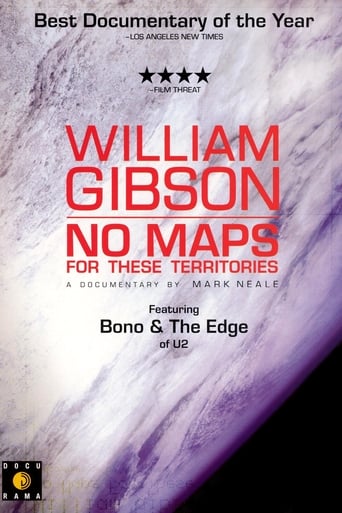pineappletyrant
Despite his unique world view and perspectives on technology, William Gibson is, I'm sorry to say, a little underwhelming on camera. It might be more accurate to describe him as just an ordinary guy--albeit one you could have a very stimulating chat with--and like any ordinary guy, watching a movie of him talking from the backseat of a car just isn't captivating for a whole hour and a half.Lacking visual content, director Mark Neale splices in an endless montage of television static, stock footage, and technological advancements, presumably in an effort to show how Progress has, for better or worse, cluttered our lives. Occasionally, the jerky jump-cuts and trick-shots serve a purpose, but mostly they produce a mind-wracking effect not unlike flipping through 150 channels in under 10 seconds.Gibson fans will still enjoy this (I did, despite it's dryness the filmmaker's well-intentioned editing spectacles), particularly to see just what the author of "Neuromancer" is like. It's probably no surprise that he comes across more than a little geeky, but he also seems very grounded, conceding the work he's known best for has an adolescent streak to it, and maturity had led him down a different path as a writer.
math_grenades
Gibson recounts his life and the meaning of his work in contemplative fashion throughout this film and the insight gained is well worth whatever work one may need to do in order to seek this out.Gibson sounds like he did too many drugs in his youth and his manner of speaking came as a surprise to me but he lets it all hang out here. His thoughts on his books and particularly his thoughts on how we are inseparable at this point from technology were pretty interesting. The way in which the film was shot was fascinating as well, as you see Gibson talking in the backseat of a car, often with a cigarette in his hand, while the world goes by. Interviews are spliced with quickly edited footage of modern day life and the effect, for the most part, works.What didn't work for me was the fact that The Edge and Bono were in the film - what's that about? Couldn't they have gotten anyone better to read his work and comment? Fortunately they're not in for long and you get very valuable insights into Gibsons work from the likes of Jack Womack and Bruce Sterling, the latter in particular recounting how when Gibson first was getting people to read the manuscript of 'Neuromancer', no one got it except for him. The film also has Gibson discuss his coinage of 'cyberspace'.If you're a huge William Gibson fan like me then this is a must and if not, what are you waiting for?
utzutzutz
He intended the notion of cyberspace as metaphor, but his readers-a nascent gen of programmers and hackers--took it much more literally. The result: the Internet as we know it. Its conceptual pioneer? William Gibson, sci-fi writer, philosopher, and here, a genial muser on the creative process, Bill Burroughs, drugs, the 1960s, and even the birth of American porn. You don't have to be a media maven or Web geek to appreciate Gibson's insights, which happen from the backseat of a car whizzing through a `postgeographic world.' Cut in are readings from his work and perspective offered by the likes of Bruce Sterling and U2's Bono. Director Mark Neale aptly uses music video-style cuts and snippets of technology to create a playful disorientation that already seems dated. But he couldn't have picked a more fascinating character, whose values embrace such concepts as living in the moment. Ironically, Gibson implants a very human heart into the digital cavity of the cyberbeast.
JonB-2
You don't need to be a fan of William Gibson to get a lot out of "No Maps for These Territories." Taking the simple form of Gibson expounding on a raft of subjects from the backseat of a car en route from Los Angeles to Vancouver, intercut with a breathtaking visual melange to illustrate his points, "Maps" is a good reminder of how truly profound have been the changes in the world in the last few years, as well as what it means to be human -- the only animal that makes maps, after all.Despite the whole "cyberpunk" label (which he rejects, anyway) Gibson comes across as intelligent, thoughtful and a rather nice person, and he looks at least a good decade and a half younger than his mid-50's baby-boomer age. And his description of his writing process is the most accurate distillation of how creativity works that I've ever heard. There isn't any BS coming from this back seat; Gibson speaks from the heart and it shows.Oddly enough, it's the hardcore fans who might be the most disappointed in this film. Gibson is almost self-deprecating in talking about his work and his fame. But it's a film that deserves to be seen, and listened to with great attention. It's also done with a stunning style that adds to, rather than distracts from, the content. The film begins with frenetic, quick-cut images, but ends up in a beautiful, elegiac mood as we drive down a fog-shrouded bridge while U2's Bono reads from Gibson's unpublished Memory Palace. The end result is moving, haunting and worth many repeat viewings to take it all in.

